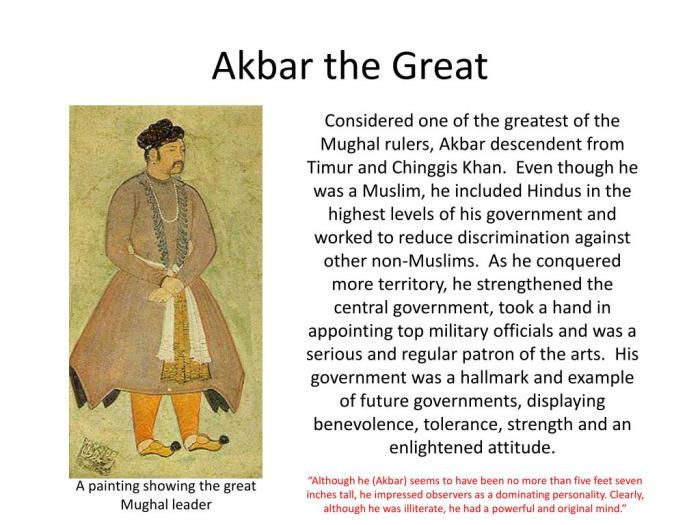Akbar AP World History Definition introduces us to one of the most influential rulers of the Mughal Empire, whose reign left an enduring mark on Indian history. Akbar’s innovative policies, military conquests, and cultural patronage shaped the course of the empire and continue to resonate today.
From his groundbreaking religious reforms to his efficient administrative system, Akbar’s reign was a period of unprecedented progress and prosperity. This exploration of Akbar AP World History Definition unveils the key aspects of his rule and its lasting impact.
Reign of Akbar

Akbar’s reign (1556-1605) marked a golden age for the Mughal Empire. His rule was characterized by religious tolerance, administrative reforms, and military conquests.
Akbar’s Religious Policies
Akbar was a devout Muslim, but he also respected other religions. He abolished the jizya tax on non-Muslims, and he promoted religious dialogue and understanding. He also introduced the Din-i Ilahi, a new religion that blended elements of Islam, Hinduism, and other faiths.
Akbar’s Administrative Reforms
Akbar implemented a number of administrative reforms that strengthened the Mughal Empire. He introduced a new land revenue system that was based on the actual yield of the land. He also created the Mansabdari system, a military and administrative hierarchy that helped to centralize power.
Akbar’s Military Conquests
Akbar was a skilled military commander. He expanded the Mughal Empire by conquering new territories in India, Afghanistan, and Central Asia. His armies were well-equipped and disciplined, and they employed a variety of strategies and tactics.
Cultural Achievements, Akbar ap world history definition
Akbar was a great patron of the arts, literature, and architecture. He commissioned the construction of many magnificent buildings, including the Red Fort in Delhi. He also encouraged the development of new forms of art and literature.
Akbar’s Legacy
Akbar’s reign had a lasting impact on Indian history. His policies of religious tolerance and administrative efficiency helped to create a stable and prosperous empire. His cultural achievements left a lasting legacy that continues to inspire artists and scholars today.
Questions Often Asked: Akbar Ap World History Definition
What is the significance of Akbar’s religious policies?
Akbar’s religious policies, including the Din-i Ilahi, promoted religious harmony and tolerance within the Mughal Empire, fostering a sense of unity among diverse religious groups.
How did Akbar’s administrative reforms contribute to the stability of the empire?
Akbar’s administrative reforms, such as the land revenue system and the Mansabdari system, established an efficient and centralized administration, ensuring stability and order throughout the vast empire.
What were Akbar’s major military conquests?
Akbar’s military campaigns expanded the Mughal Empire significantly, conquering territories such as Gujarat, Bengal, and Kashmir, and extending its influence across the Indian subcontinent.




